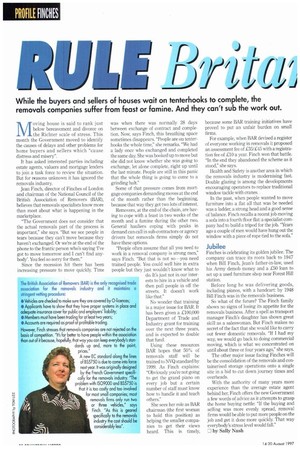11 1,111. Fin fa,
Page 40

If you've noticed an error in this article please click here to report it so we can fix it.
While the buyers and sellers of houses wait on tenterhooks to complete, the removals companies suffer from feast or famine. And they can't sub the work out.
Moving house is said to rank just below bereavement and divorce on the Richter scale of stress. This month the Government moved to identify the causes of delays and other problems for home buyers and sellers which "cause distress and misery".
It has asked interested parties including estate agents, valuers and mortgage lenders to join a task force to review the situation. But for reasons unknown it has ignored the removals industry.
Jean Finch, director of Finches of London and chairman of the National Council of the British Association of Removers (BAR), believes that removals specialists know more than most about what is happening in the marketplace.
"The Government does not consider that the actual removals part of the process is important," she says. "But we see people in tears because they can't move because they haven't exchanged. Or we're at the end of the phone to the frantic person who's saying 'I've got to move tomorrow and I can't find anybody'. You feel so sorry for them."
Since the recession hit there has been increasing pressure to move quickly. Time was when there was normally 28 days between exchange of contract and completion. Now, says Finch, this breathing space sometimes disappears. "People are on tenterhooks the whole time," she remarks. "We had a lady once who exchanged and completed the same day. She was booked up to move but she did not know whether she was going to exchange, let alone complete, right up until the last minute. People are still in this panic that the whole thing is going to come to a grinding halt."
Some of that pressure comes from mortgage companies demanding moves at the end of the month rather than the beginning, because that way they get two lots of interest.
Removers, at the end of the chain, are having to cope with a feast in two weeks of the month and a famine during the other two. General hauliers coping with peaks in demand can call in sub-contractors or agency drivers but removals firms simply do not have these options.
"People often assume that all you need to work in a removal company is strong men," says Finch. "But that is not so—you need trained people. You could well hire in extra people but they just wouldn't know what to do. It's just not in our interests to hire in a vehicle and then pull people in off the streets. It doesn't work like that."
No wonder that training is a major issue for BAR. It has been given a £100,000 Department of Trade and Industry grant for training over the next three years, and is expected to double that fund.
Using these resources BAR hopes that 50% of removals staff will be trained to NVQ standard by 1999. As Finch explains: "Obviously you're not going to get the grand piano on every job but a certain number of staff must know how to handle it and teach others."
She sees her role as BAR chairman (the first woman to hold this position) as helping the smaller companies to get their views heard. This is timely, because some BAR training initiatives have proved to put an unfair burden on small firms.
For example, when BAR devised a register of everyone working in removals it proposed an assessment fee of L35/£45 with a registration fee of £10 a year. Finch won that battle. in the end they abandoned the scheme as it stood," she says.
Health and Safety is another area in which the removals industry is modernising fast. Double glazing is among the developments encouraging operators to replace traditional window tackle with cranes..
In the past, when people wanted to move furniture into a flat all that was be needed was a ladder, a strong head and a good sense of balance. Finch recalls a recent job moving a sofa into a fourth floor flat: a specialist company had to build a tripod for the job. "Years ago a couple of men would have hung out the window with a piece of rope tied to the sofa."
Jubilee
Finches is celebrating its golden jubilee. The company can trace its roots back to 1947 when Bill Finch, Jean's father-in-law, used his Army demob money and a £50 loan to set up a used furniture shop near Forest Hill station.
Before long he was delivering goods, including pianos, with a handcart: by 1948 Bill Finch was in the removals business.
So what of the future? The Finch family shows no signs of losing its appetite for the removals business. After a spell as transport manager Finch's daughter has shown great skill as a saleswoman. But Finch makes no secret of the fact that she would like to carry out fewer domestic removals. "If I had my way, we would go back to doing commercial moving, which is what we concentrated on until about three or four years ago," she says.
The other major issue facing Finches will be the consolidation of the removals and containerised storage operations onto a single site in a bid to cut down journey times and overheads.
With the authority of many years more experience than the average estate agent behind her, Finch offers the new Government a few words of advice as it attempts to grasp the home buying nettle: "If the buying and selling was more evenly spread, removal firms would be able to put more people on the job and get it done more quickly. That way everybody's stress level would fall."
by Sally Nash
















































































































